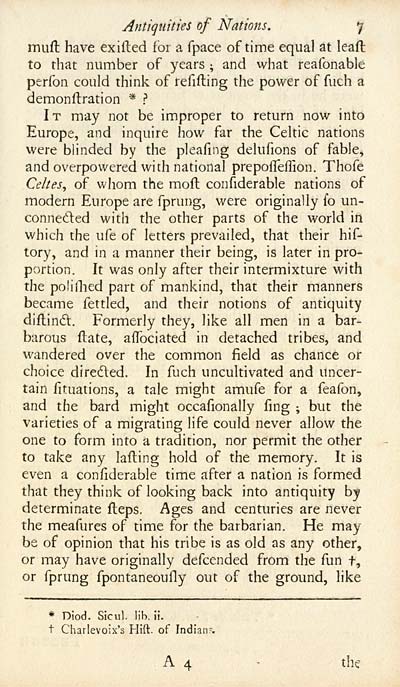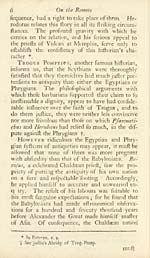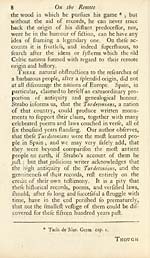Blair Collection > Critical dissertations on the origin, antiquities, language, government, manners, and religion, of the antient Caledonians, their posterity the Picts, and the British and Irish Scots
(45)
Download files
Complete book:
Individual page:
Thumbnail gallery: Grid view | List view

Antiquities of Nations. 7
mufl have exifted for a fpace of time equal at leaft
to that number of years ; and what reafonable
perfon could think of refifting the power of fuch a
demonftration * ?
It may not be improper to return now into
Europe, and inquire how far the Celtic nations
were blinded by the pleafing dekifions of fable,
and overpowered with national prepolTeflion. Thofe
Celtes, of whom the moll confiderable nations of
modern Europe are fprung, were originally ib un-
conneded with the other parts of the world in
which the ufe of letters prevailed, that their hif-
tory, and in a manner their being, is later in pro-
portion. It was only after their intermixture with
the polillied part of mankind, that their manners
became fettled, and their notions of antiquity
diflind. Formerly they, like all men in a bar-
barous ftate, alTociated in detached tribes, and
wandered over the common field as chance or
choice di reded. In fuch uncultivated and uncer-
tain fituations, a tale might amufe for a feafon,
and the bard might occafionally fing ; but the
varieties of a migrating life could never allow the
one to form into a tradition, nor permit the other
to take any lading hold of the memory. It is
even a confiderable time after a nation is formed
that they think of looking back into antiquity by
determinate fteps. Ages and centuries are never
the meafures of time for the barbarian. He may
be of opinion that his tribe is as old as any other,
or may have originally defcended from the fun t,
or fprung fpontaneoufly out of the ground, like
* Diod. Sicul. lib. if.
t Charlevoix's Hift. of Indian",
A 4 - the
mufl have exifted for a fpace of time equal at leaft
to that number of years ; and what reafonable
perfon could think of refifting the power of fuch a
demonftration * ?
It may not be improper to return now into
Europe, and inquire how far the Celtic nations
were blinded by the pleafing dekifions of fable,
and overpowered with national prepolTeflion. Thofe
Celtes, of whom the moll confiderable nations of
modern Europe are fprung, were originally ib un-
conneded with the other parts of the world in
which the ufe of letters prevailed, that their hif-
tory, and in a manner their being, is later in pro-
portion. It was only after their intermixture with
the polillied part of mankind, that their manners
became fettled, and their notions of antiquity
diflind. Formerly they, like all men in a bar-
barous ftate, alTociated in detached tribes, and
wandered over the common field as chance or
choice di reded. In fuch uncultivated and uncer-
tain fituations, a tale might amufe for a feafon,
and the bard might occafionally fing ; but the
varieties of a migrating life could never allow the
one to form into a tradition, nor permit the other
to take any lading hold of the memory. It is
even a confiderable time after a nation is formed
that they think of looking back into antiquity by
determinate fteps. Ages and centuries are never
the meafures of time for the barbarian. He may
be of opinion that his tribe is as old as any other,
or may have originally defcended from the fun t,
or fprung fpontaneoufly out of the ground, like
* Diod. Sicul. lib. if.
t Charlevoix's Hift. of Indian",
A 4 - the
Set display mode to: Large image | Transcription
Images and transcriptions on this page, including medium image downloads, may be used under the Creative Commons Attribution 4.0 International Licence unless otherwise stated. ![]()
| Permanent URL | https://digital.nls.uk/76287106 |
|---|
| Description | A selection of books from a collection of more than 500 titles, mostly on religious and literary topics. Also includes some material dealing with other Celtic languages and societies. Collection created towards the end of the 19th century by Lady Evelyn Stewart Murray. |
|---|
| Description | Selected items from five 'Special and Named Printed Collections'. Includes books in Gaelic and other Celtic languages, works about the Gaels, their languages, literature, culture and history. |
|---|

